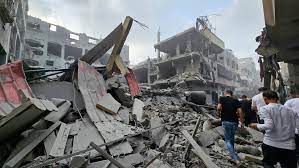Manas Dasgupta
NEW DELHI, Oct 23: Israel military said they had conducted “limited” grounds raids into the Gaza Strip overnight to fight Hamas fighters aimed at destroying sites where Hamas was believed to be assembling to attack Israel.
In a televised briefing, Israel military spokesperson Rear Admiral Daniel Hagari said the country’s ground forces carried out some raids inside Gaza. He said the raids had been conducted by the “armoured and infantry” battalions.
Israel is determined to crush Hamas but has said little about what would replace its rule in Gaza after the war, with observers expecting Washington will play a decisive role. “One thing is clear: the Gaza Strip will not be ruled by Hamas once this war is over,” Israeli government spokesman Eylon Levy has said as Israel’s military steps up strikes in preparation for a widely-expected ground offensive.
In the wake of the October 7 attacks, when militants from the Palestinian Islamist movement began a deadly cross-border assault that has killed 1,400 people, Israel has laid out just one objective: “Destroying Hamas.” Since then, it has embarked on a brutal retaliatory bombing campaign, which Gaza’s Hamas-run health ministry says has now killed more than 5,000 people.
Elaborating on the incursions that went “deep” into Gaza, Hagari said, “During the night there were raids by tank and infantry forces. These raids are raids that kill squads of terrorists who are preparing for the next stage in the war.” He also said the Israeli forces were trying to find information on missing hostages. Over 200 people were taken hostage by Hamas operatives when they infiltrated and attacked cities in southern Israel on October 7.
In retaliation, Israel has pummelled the Hamas-controlled Palestinian territory with air strikes for over two weeks and is also mobilising troops along the Gaza border for a ground offensive. The Israeli military said it had hit “over 320 military targets in the Gaza Strip” over the past 24 hours.
“The terror targets struck included tunnels containing Hamas terrorists, dozens of operational command centres… and Islamic Jihad terrorists, military compounds, and observation posts,” the army said in a statement.
Hamas released a statement too on the attacks and claimed that they destroyed the equipment of the Israeli raid party and forced them to retreat. “Fighters engaged with the infiltrating force, destroying two bulldozers and a tank and forced the force to withdraw, before they returned safely to base,” the Hamas statement said.
Israel has warned the residents in northern Gaza to move south for their safety, and the United Nations says more than half of the territory’s 2.4-million population is now displaced. Hundreds of thousands of civilians are believed to remain in and around Gaza City in the north, unwilling or unable to leave.
Despite four previous wars with Gaza’s Hamas rulers — in 2008, 2012, 2014 and 2021 — Israel has never before threatened to completely overthrow the movement which rules this tiny territory of 2.4 million people. The territory, which has been languishing under an Israeli and Egyptian blockade since Hamas took control in 2007, has since October 7 suffered a spiralling humanitarian crisis, largely deprived of water, food and other basic supplies and more than a million people displaced.
Although Israel withdrew its soldiers and settlers from Gaza in 2005, ending an occupation that began in 1967, the international community considers it responsible for the tiny territory’s primary needs — energy, food and medicine. Prime Minister Benjamin Netanyahu has called it a “do or die” war. And his government is hoping to end all responsibility for Gaza as part of a “new regional reality” it hopes will emerge after the war.
After the current air strikes and action inside Gaza, Defence Minister Yoav Gallant said a “third phase” would involve “the removal of Israel’s responsibility for life in the Gaza Strip, and the establishment of a new security reality for the citizens of Israel.” But no minister talks about Gaza’s future government. And nobody has raised the possibility of a new Israeli occupation of the enclave, the military and financial burden of such an eventuality being too high to bear.
“We are discussing possibilities with our partners,” said government spokesman Levy. Israel wants to “hand over the keys” to a third party, a foreign ministry source said, speaking on condition of anonymity. According to Eitan Shamir, a former Israeli government security specialist and now director of Jerusalem’s Begin-Sadat Centre for Strategic Studies, Washington will have a decisive say in Gaza’s future.
The US, he said, already has an “overview” role in Israel’s action against Hamas.
“The favourite option of the Americans and Israelis would be an international structure with Palestinian Authority, with Saudi funding, for example,” Shamir said adding “it could include US and European administrative help.”
US President Joe Biden has given Netanyahu strong support, visiting Israel last week and warning other regional players not to get involved while lining up almost $15 billion in military aid, even if he has warned Israel against letting its “rage” go too far. But Washington has also not been clear about how it sees Gaza’s future.
“Something needs to be found that ensures Hamas can’t do this again but also doesn’t reverse to an Israeli governance of Gaza which they do not want,” US Secretary of State Antony Blinken said on Sunday. “There are different ideas out there about what could follow and all of that needs to be worked, even as Israel is dealing with the current threat.”

